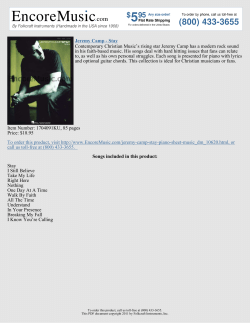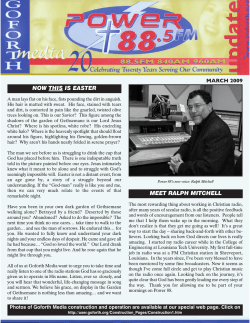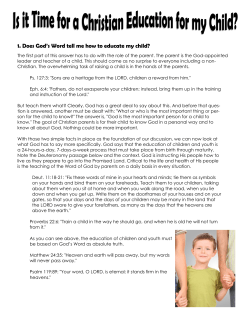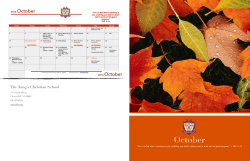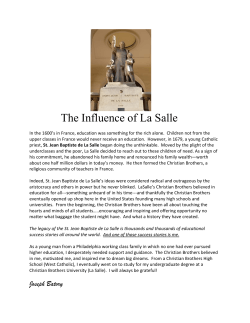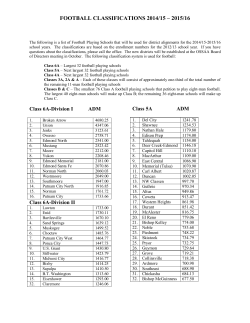
A Silver Anniversary: NACFLA Past, Present, and Future
North American Christian Foreign Language Association 25th Annual Conference, April 9-11, 2015 A Silver Anniversary: NACFLA Past, Present, and Future Biola University La Mirada, California Keynote Speaker Dr. David Smith NACFLA 2015 - PROGRAM OVERVIEW THURSDAY APRIL 9 6:00 – 8:00 Registration, welcome, reception FRIDAY APRIL 10 Dr. David Smith is the Director of Graduate Studies in Education at Calvin College (Grand Rapids, Michigan), as well as the Director of the Kuyers Institute for Christian Teaching and Learning. He completed his Ph.D. at the Institute of Education, University of London, UK, with a dissertation on “Modern language pedagogy, spiritual development and Christian faith: A study of their interrelationships.” Since then, his work has continued to focus on the intersection between Christian faith and educational practice. He has published extensively in the areas of educational philosophy and modern German literature, and currently teaches courses in curriculum and pedagogy. He is much in demand as a guest speaker and educational consultant around the world. David Smith has also been an integral part of NACFLA for many years. As a keynote speaker, presenter, and long-time editor of the Journal of Christianity and Foreign Languages, he has left an indelible mark on our association. His publication with Dr. Barbara Carvill of The Gift of the Stranger: Faith, Hospitality and Foreign Language Learning (Eerdmans, 2000), became a landmark book for Christian scholars, and his numerous other publications have been widely used by NACFLA members in their teaching and scholarship. It is entirely fitting that he should address our members on this, our silver anniversary, and we count it a privilege to welcome him as keynote speaker on this auspicious occasion. 8:30 – 9:00 9:00 – 9:15 9:15 – 10:45 10:45 – 11:00 11:00 – 12:45 1:00 – 2:00 2:15 – 3:45 3:45 – 4:00 4:00 – 5:30 6:00 – 7:00 7:00 Worship Break Keynote Speaker Break SESSION I Plenary Session Lunch SESSION II Break SESSION III Dinner Evening Activity SATURDAY APRIL 11 8:30 – 9:00 Worship 9:00 – 9:15 Break 9:15 – 10:45 SESSION IV 10:45 – 11:00 Break 11:00 – 12:30 SESSION V 12:45 – 1:45 Lunch 1:45 – 2:45 Business Meeting 2:45 – 3:00 Final Worship Session I Plenary Session Friday, April 10, 2015 11:00-12:45 NACFLA Past, Present, and Future: Our Website and Our Journal Session II A Presider: Tamara Townsend Friday, April 10, 2015 Scott Bennett, Point Loma Nazarene University Flipped Learning Building Community Through Technology: NACFLA in the 21st Century I propose to bring the NACFLA community together through contemporary forms of social media. I will highlight our new website, and then share ways in which members can become connected and create a new vision for the future, based on the inspiration of 1 John 4:11: "Dear friends, since God so loved us, we also ought to love one another." (NIV) Jan Evans and Jennifer Good, Baylor University; Cynthia Slagter, and David Smith, Calvin College NACFLA’s Journal of Christianity and Foreign Languages This session will answer the following questions and many more: Why have a journal devoted to the integration of faith and learning in the world language classroom? Who has edited the journal and where has it been published? How many libraries hold the journal? How do I get published in the journal? How will the journal be sustained in the future? From its initial volume in 2000, our journal has contributed greatly to the understanding of the integration of faith and learning in the world language classroom. We will give tribute to its pioneers, describe present procedures and expectations for those wishing to publish in the journal, and finally, present some of our hopes and aspirations for the journal in the years ahead, asking our members to dream with us about achieving a larger pool of contributor, wider distribution and greater influence for the periodical. 2:15-3:45 Patty Tinkey, City Grove College; Rikki Heldt, Dordt College; Allan Curnew, Redeemer University College; Marcela Rojas, Azusa Pacific University A Christian Perspective of Flipped Learning: What, Why, and How This panel shares what “Flipped Learning” is, why this method extends teaching/learning time, and how panel members implemented it (including the tools/technology used). Flipped learning happens when the instructor’s lecture is delivered outside of the traditional class time, via a video students view on their own. Class time is then used for activities, discussions, and conversations based on what they have learned. These French and Spanish educators found that “flipping the classroom” helped students take ownership of their learning, promoted a hospitable environment, and provided time for more student feedback and engagement. Session II B Friday, April 10, 2015 2:15-3:45 Session II C Faith and Learning Friday, April 10, 2015 Presider: XXX Chinese Tasha Maria Bleistein and Manar Metry, Azusa Pacific University 2:15-3:45 Presider: XXX Faith Integration Litong Chen, Ohio State University, Graduate Student Online MA TESOL faculty outline the transformation that occurred in respect to faith integration as integration moved from individual classes with repetitive content to a unified plan scaffolding concepts across courses, so that graduates can articulate Christian views on language, language learners, and teaching, and demonstrate the impact of faith on pedagogy. Michael Lessard-Clouston, Biola University Examining Faith and Learning in Foreign Language Teacher Education Let’s Watch and Discuss Jesus’ Story in the Foreign Language Classroom: Using the Jesus Film as an Example This paper addresses how foreign language teachers can utilize Biblical films in classroom instruction and teaching material development for students at intermediate or higher levels. The Jesus film (1979 version, in Mandarin Chinese) is used to demonstrate principles and methods that are applicable to foreign language teaching in general. Reporting on a survey of current beliefs and practices, this presentation describes L2/FL teacher educators’ modelling of faith and learning integration (FLI), the specific practices they employ, and how they train student teachers to carry out FLI in different contexts. Participants’ FLI advice and implications for research are also discussed. De Zhang, Bethel University Mary Shepard Wong, Azusa Pacific University This presentation will discuss a U.S.-China telecollaborative project connecting U.S. college students studying TESOL and college students in China interested in teaching Chinese to speakers of other languages. The effects of this collaboration on the students’ professional development in intercultural communicative competence, awareness of Christianity in teaching language, and technology use will be examined. A Buddhist, a Christian, and a Muslim Walk into a Classroom: Lessons from Religious Others about Faith’s Impact on Language Teaching Spirituality, like language, has the potential to connect us and move us beyond ourselves. In this session, the presenter explores how Buddhist, Christian, and Muslim educators allow their spirituality to impact their identity, classrooms, and teaching materials. Come and see what can be learned from our religious other language educators. Telecollaboration for American and Chinese Language Learners and Preservice Teachers Session III A Friday, April 10, 2015 4:00-5:30 Session III B Government Corruption and Abuse of Power in Mexican Friday, April 10, 2015 4:00-5:30 Film and Literature (Presentations in Spanish) French Presider: Artemiza Hernández The films Red Dawn, Herod’s Law, and The Perfect Dictatorship, the collection of interviews in La noche de Tlatelolco, and the novel Los de abajo, shape our collaborative examination of how governmental corruption and abuse of power has suppressed political opposition in Mexico and how we as Christians should approach it. Presider: XXX Juan Núñez and Aaron Kang - Biola University Students Literary criticism on ecological issues has focused on text from the English tradition (post 1800’s) and often represents Christian doctrine as anthropocentric and anti-environmental. However, a Christian engagement of ecocriticism in French renaissance literature undermines facile assumptions about Christian anti-environmentalism, while offering novel perspectives on critical questions in the field. Andrew Soria, University of Southern California, Graduate Student The Sacramentalized Quotidian in Philippe Delerm and Robert Bresson This paper examines how a Christian “poétique de l’espace” could be nuanced from phenomenological philosophies of the everyday. Analyzing Artemiza Hernández –Biola University Philippe Delerm and Robert Bresson, I attempt to demonstrate how artistic Mexico’s Perfect Dictatorship emphasis on the quotidian supports a sacramentalized view of daily routine This paper analyzes Mexico’s “democratic” political system throughout the as a locus to dispense grace and promote reconciliation. 1900s as seen in the films Red Dawn, Herod’s Law, and The Perfect Victor Velázquez, Biola University Dictatorship. It reveals that democracy has not even begin to take shape in society because it has been ruled by an authoritarian party that works counter Ecocritical Approaches to French Literature: the Case for the Sixteenth Century to biblical principles, seeking power, money, and ongoing class distinctions. The Tlatelolco Massacre: The Responsibility of Every Citizen in the Eyes of God An analysis of the interviews in La noche de Tlatelolco, dealing with the Mexican Tlatelolco Massacre of 1968, shows how the government failed to respect basic human rights and acted in contradiction to both scriptural and democratic values, abusing its power and suppressing the students’ hopes and aspirations for a better country. Verónica Núñez- Biola University Student Corruption as the Means to Advance in Life This paper provides examples of corruption in Mexico as shown in film and literature and explains how we as Christians should approach it. I will discuss how La ley de Herodes and Los de abajo portray Mexico as a corrupt society, how these stories reveal the way in which people are corrupted, and what drives them to perpetuate this major problem in Mexico. Kelsey Haskett, Trinity Western University Teaching French Existentialist Literature from a Christian Perspective Most French programs include twentieth-century literary works by wellknown authors such as Camus and Sartre. I will discuss ways to teach this literature from a Christian perspective, by helping students explore life’s critical questions as addressed in these works and compare them to a biblical perspective, thus reinforcing their faith as they examine the underlying philosophies of both worldviews. Session III C Friday, April 10, 2015 Session IV A 4:00-5:30 Saturday, April 11, 2015 9:15-10:45 Building Character, Fostering Encouragement, and Exercising Moral Responsibility Overarching Considerations and Solutions Presider: XXX Marcie Pyper and Cynthia Slagter, Calvin College Jane Muir, Baylor University Shifting the Paradigm for Christian World Language Teaching: Learning from the Past, Working Together for the Future Incorporating Character and Culture into the Beginning Language Classroom Beginning language classes focus on the vocabulary and grammar of the foreign language, often to the detriment of cultural engagement and the fostering of character formation. This presentation will highlight ways of engaging culture and character formation based on personal experience and interviews. We will end with group discussion. Presider: XXX At NACFLA we are committed to offering a distinctively Christian approach to teaching World Languages. This presentation will briefly examine past efforts, highlight available resources, and invite attendees to collaborate in a new effort to reorient current World Language curriculum so that it might more clearly reflect a Christian perspective. Amy Obrist, Biola University Audrey Johnson, Baylor University The State of the Profession in CCCU Colleges and Universities Fostering an Atmosphere of Encouragement in the Beginning Language Classroom This White paper will provide an overview of the state of our profession in CCCU colleges and universities based on current, past, and planned language and program offerings. It will examine narrative material from department chairs to ascertain the level of support they perceive their institutions to provide and draw conclusions based on both data and narrative material. This paper relies on my experiences and interviews with colleagues to explore the foreign language classroom as a place where both students who struggle and those who succeed quickly expand their ability to show Christian empathy and encouragement to one another. Richard Robison, Azusa Pacific University The Moral Responsibility of Language Teaching Is language an amoral information channel created by God for humanity’s benefit? Or is it better characterized as a morally-charged force? Arguing for the latter, I will discuss how we should teach language if we view students as moral agents and language as a powerful tool with moral consequences. Julia A. Villaseñor, Malone University New Realities in Foreign Language Education: Spanish for Professional Purposes How do we reverse the trend of steady decline in enrollment in foreign language programs while staying true to our mandate as educators at Christian institutions to provide valuable learning experiences and “hospitality to the stranger”? This presentation will highlight an innovative program that combines Spanish for healthcare with outreach to underserved populations. Session IV B Saturday, April 11, 2015 9:15-10:45 Christian Perspectives on Linguistics Presider: Scott Lamana This session offers a Christian perspective on linguistics from various angles, including the role of linguistics in NACFLA, recent work by Christian linguists inside and outside of NACFLA, insights from an explicitly Christian engagement with the contemporary field of linguistics, and the importance for Christian educators of understanding how the use of Spanglish marks Hispanic identity. Marilyn Bierling, Calvin College Linguistics at NACFLA: past, present, and future During NACFLA´s 25-year history we have heard many presentations on the importance of language, but few presentations on specific areas of linguistics. This presentation summarizes the work that NACFLA has done so far in linguistics and examines ways in which linguistic studies can play an important role in the future. Scott Lamanna, Calvin College Preliminary Reflections on the Relevance and Usefulness of Applying a Christian Perspective to the Analysis of Linguistic Variation Drawing on three recent works (two Christian and one non-Christian) that address issues related to language and/or linguistics, this presentation suggests some insights that can be gleaned from an explicitly Christian engagement with the contemporary field of linguistics, and how these insights might inform and enrich our second language pedagogy. Grace Kim, Calvin College Student Spanglish as a Reflection of Identity: What Christian Educators Should Know In response to the influx of Spanish-speaking immigrants to the United States, the use of Spanglish has increased dramatically among Hispanic Americans. Based on a sociolinguistic perspective, this presentation provides an orientation for Christian educators on Spanglish as a reflection of the intercultural identity of Hispanics in the United States. Session IV C Saturday, April 11, 2015 9:15-10:45 Hispanic Film and Theater Presider: XXX Valentin Gonzalez-Bohorquez, Pasadena City College Even the Rain. The Gaze of the Other on the Gold and Water Wars (Presented in Spanish) Even the Rain (2010), by Iciar Bollain, tells the unofficial history of the Spanish conquest of America, while also using the Water War in 2000 in Cochabamba to reveal and condemn the ongoing presence of foreign powers. This presentation explores, from a Christian perspective, the effects of the forced imposition of faith and the constructs of the native as the Other. Sarah Rabke, Baylor University, Graduate Student Azorín’s Lo invisible: The Blending of Two Generations In Lo invisible, Azorín combines Generation of 1898 themes and Generation of 1927 techniques to rejuvenate Spanish theater. Azorín believed 20th century Spanish society had lost its identity, and rather than rejecting a Christian message, he imbibes this work with a hope that transcends the darkness of the period. Benjamin T. Moss, Baylor University, Graduate Student Los Amantes de Teruel: Spiritual Conflict and the Triumph of Good In Los Amantes de Teruel (1837), Eugenio Hartzenbusch uses a medieval love story to depict the conflict in Spain between Moors and Christians. Examining the binary opposition between the protagonists Isabel, an angelic Christian, and the Queen of Valencia, a satanic Moor, reveals how Hartzenbusch accomplishes dramatic effects and highlights the themes of deceit, good and evil, and a sacrificial Christian love that triumphs in the end. Session V A Session V B Saturday, April 11, 2015 11:00-12:30 Saturday, April 11, 2015 11:00-12:30 Pedagogical Insights Spanish Literature and Literary Creation Presider: XXX Presider: XXX Silvia Brynjolfson, Trinity Western University Kelsey Schlichting, Baylor University, Graduate Student Correct Mistakes, or Let Them Speak? Theory and Practice of Correcting Mistakes in Foreign Language Classes Intentional Awareness of Injustice through Literature By examining concientización in Gioconda Belli’s novel, The Inhabited Woman, the main character becomes aware of unsettling truths of injustice and oppression surrounding her. I contend that in reading such novels, Christians should seek to experience the dissonance that parallels that of the character, raising our own awareness of injustice, for the sake of God’s kingdom. This presentation will explore different approaches to oral correction that have been used during past decades and identify recent successful practices. Based on studies done in bilingual settings, it will examine the recast method, showing both its limitations and useful variations which will help teachers address students’ oral mistakes. It will also reflect on the correcting Claudia Luque, Point Loma Nazarene University Student methodology used in Jesus’ life. The Hyphen-Nation (Presented in Spanish and English) Julianne Bryant, Biola University He, he/she, she/he, they….What are the Implications of Gendered Pronouns for our Students? This paper explores the widely debated issue of gender inclusive language. As language teachers at faith based institutions we should not only be concerned about how language allows one to relate to others, but how it expresses and reflects our concepts of God, Jesus Christ and our particular role as Christians. Kitty Purgason, Biola University Multi-level Activities with Proverbs in ESL and FL Classes Proverbs are a great source of input in a language class because of their brevity. This presentation focuses on how to use them for speaking, writing, grammar, pronunciation, critical thinking, spiritual stimulus, and intercultural communication and in such a way that students of different proficiency levels can participate together. “The Hyphen-Nation” is a poem that celebrates the hybrid culture of Hispanics and Latinos living in the United States. It provides intimate insights into the identity challenges experienced by this synthesized culture while also seeking to expose the beauty of its diversity. It aims to acknowledge the symbolism of the hyphen and establish Christ-like views of equality, as shown in Ephesians 2:14. Katey Erickson, Wheaton College Student Menchú for a New Christian Reader: Text, Translation, and “Concientización” A bilingual reading of Rigoberta Menchú’s testimonial narrative, Me Llamo Rigoberta Menchú y así me nació la conciencia (1982), demonstrates that its English translation, I, Rigoberta Menchú, an Indian Woman in Guatemala (1983), presents a filtered story through which only the increased awareness or concientización of intended monolingual North American audience is possible. Session V C Saturday, April 11, 2015 11:00-12:30 Online Communication, Study Abroad, and Language Preparation Presider: XXX Maria Wilbar, Biola University Advancing the Oral Skills through Online Synchronous Communication with Native Speakers, while Facilitating Faith Integration This study considers a group of Spanish language acquisition students interacting with native-language speakers (NS), through the use of online synchronized video and voice (SVVCMC), in a comparison with studyabroad students. It also shows how advance preparation of student testimonies in the target language (TL) and appropriate conversational topics with NS facilitated faith integration. Mary Docter, Westmont College Bringing Them Home: Helping Students with Reentry To cultivate global Christians, we regularly send students abroad but often fail to help them once they return. This talk focuses on the often-neglected process of re-entry, specifically showing how a semester-long re-entry seminar helps students readjust to their home culture, provides opportunities for reflection and sharing (especially the students’ faith journey), and strengthens skills and knowledge gained abroad. Alex Nix Vaughan, La Vega High School Foreign Language Study: What the Students Say… Considering that the college students are no more than high school students that have received a diploma, how can we can better prepare them for the rigors of foreign language study, so that we can impart to them, as Christian educators, a love for language-learning,? This paper will discuss reasons for the appeal or lack thereof of foreign language study for current high school students.
© Copyright 2025

